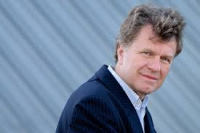Difference between revisions of "Boris Dittrich"
| Line 45: | Line 45: | ||
* [[LGBTQ Members of the Order of Orange-Nassau]] | * [[LGBTQ Members of the Order of Orange-Nassau]] | ||
* [[Justice of the Peace, Magistrates, and District Court Judges Who Are LGBTQ]] | * [[Justice of the Peace, Magistrates, and District Court Judges Who Are LGBTQ]] | ||
| + | * [[Adoption, Parenting and Family Activists for the LGBTQ Community]] | ||
==Further Reading/Research== | ==Further Reading/Research== | ||
Revision as of 13:19, 19 May 2020
Contents
Country
Netherlands
Birth - Death
1955 -
Occupation
Activist. Politics
Notable Achievements
Order of Orange-Nassau
Description
Boris Dittrich is a former Dutch politician who continues to advocate globally on human rights issues. In 2001 he introduced a bill to the Dutch parliament to allow same-sex marriage rights in the country. When it passed, the Netherlands became the first country in the world to allow such marriages. Today, there are 19 countries which have followed Boris Dittrich’s lead.
Dittrich formally trained as a lawyer at the Leiden University. After working in private practice, he was appointed a District Court judge from 1981-1989. After this period, Dittrich became a professor of European History at the University of Utrecht. He was elected a local councillor in Amsterdam South from 1990 to 1994.
In 1994, Dittrich successfully ran for national parliament as a member of the liberal party Democrats 66. He became leader of the party in 2003 and formed a coalition government that lasted until 2006.
As a member of Parliament, Dittrich is noted for his personal and party’s support for advancing many human rights issues. These included laws against stalking, for victim’s rights in criminal trials, against Dutch participation in the Afghan war, and many bills related to LGBTQ rights.
The most momentous of these LGBTQ bills was the introduction of same-sex marriage rights which, when passed in 2001, made the Netherlands the leader in this movement. As a gay man himself, he was a vigorous proponent of the legislation and his personal public appeal ensured both parliamentary passage and majority public approval. Dittrich followed this up with the world’s first legislation allowing adoption by LGBTQ couples.
After a successful political career, Dittrich retired to private activism in 2006. At this time he became Advocacy Director of the LGBTQ rights program at Human Rights Watch. His specific role is to advance global issues pertaining to LGBTQ rights. The most important of these was the establishment of International Human Rights Day, held each year on December 10th. Dittrich continues to work in this position to this date with many successful initiatives. Included among these are United Nations resolutions passed which condemn discrimination based on sexual orientation, and calls for countries to respect the rights of LGBTQ individuals in all countries.
He also remains an active academic on global human rights issues with a specific focus on LGBTQ rights. Along with his lecturing, he has written two books on the topic between 2001-2009 and two books of fiction. Boris Dittrich has spoken up about the maltreatment of LGBTQ individuals within the Catholic church, the flagrant violation of rights in Russia and many Eastern European countries, and the similar lack of respect and rights for the LGBTQ communities in many African countries.
Boris Dittrich has received numerous honours for his pioneering work. He received the Netherland’s highest civilian honour when appointed a Knight of the Order of Orange-Nassau in 2006.
That Boris Dittrich’s activism stems from his own homosexuality is a given. He has lived his entire life as an openly gay man and utilized his own same-sex marriage legislation to marry. His legal background is the basis of his ongoing activism. How has Dittrich successfully done this? Most often, he has mixed personal belief with on-the-ground experience to advance a logical argument for the protection of human rights. For example, before tackling the issue of LGBTQ rights in Eastern Europe, he travelled to those countries and met with activists, political leaders, and other residents to learn of their experiences, frustrations, and opposition viewpoints. His direct experience as a politician has aided his work.
What Dittrich often finds on these fact-finding missions is that general opposition to the advancement of LGBTQ rights is based on weak assumptions, or influence from outside forces, rather than a strong national opinion. Dittrich utilizes a strategy of time, conversation, and patience to achieve his ends, and the LGBTQ community is better off for his monumental efforts.
Married to artist Jehoshua Rozenman.
See Also
- LGBTQ Members of the Order of Orange-Nassau
- Justice of the Peace, Magistrates, and District Court Judges Who Are LGBTQ
- Adoption, Parenting and Family Activists for the LGBTQ Community

